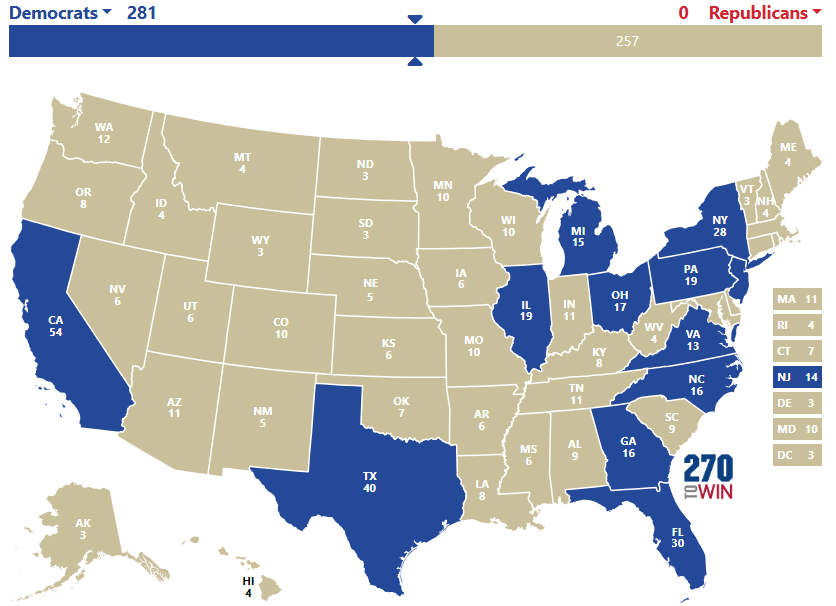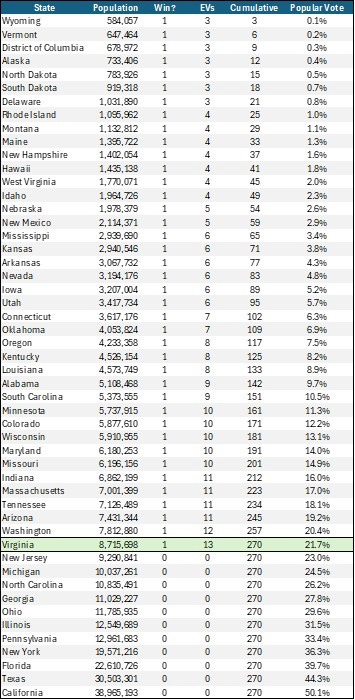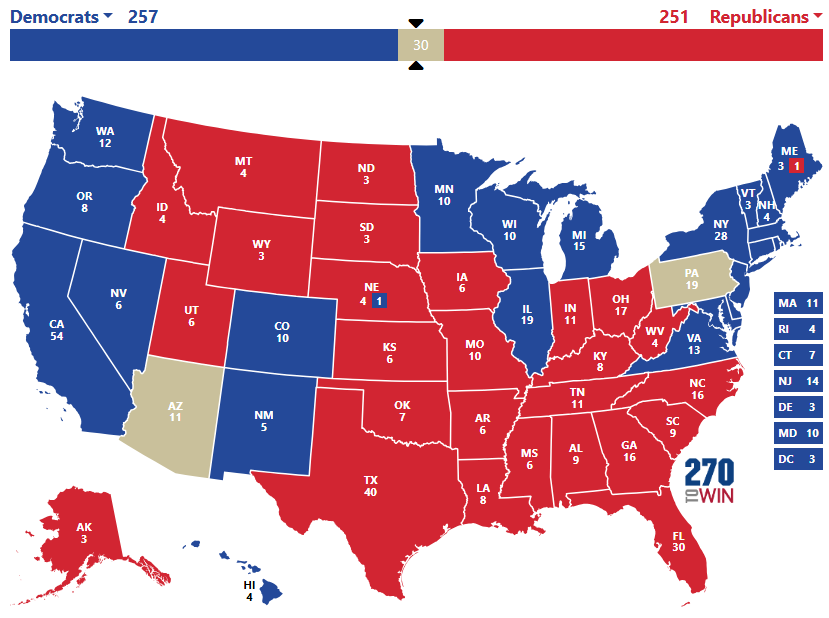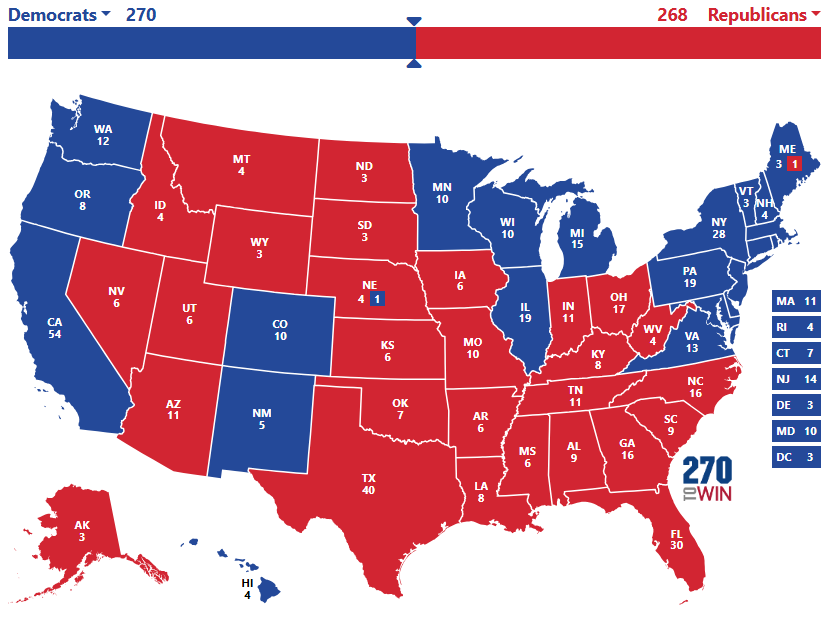preempting the discussion
electoral college chat
Catan
I often get criticized for caring too much about the rules. For example, there is a rule in Settlers of Catan that is often ignored but potentially game changing. Regarding the “Longest Road” card, on page 9 of the standard Settlers of Catan rule book it states that a Longest Road can be broken if an opponent builds a settlement in the middle of your road, which is possible if you have not built settlements on adjacent intersections. This is…uncommon. I’ve rarely seen it happen. But it has the potential to cause a lot of anguish. It results in a swing of five points (-2 for the loser, +3 for the winner) and could easily result in a winning condition. For those unfamiliar with Catan, all you need to know is that the game is played to ten points, and this move has the potential to result in three points — a massive amount.
If someone is familiar with the rules and decides to use this as a winning move, shifting the two additional points to their score total it can result in a frustrating end game for those people who (i) forgot about the rule, (ii) didn’t know about the rule, or (iii) are pissed about losing and don’t care if it’s a legal move.
This is annoying — but in a friendly board game what’s the correct way to handle this? Do we let the rule pass if it doesn’t result in the winning move? Do we just shun the experienced player who does it? Do we encourage a first timer to make the move and win the game? All of these is subjective and relies on the goodwill of all involved. That cannot be assumed in all areas of life.
Credit Agreements
In my day job I work with loans. At its core it is very simple — I lend you money you pay me back. If you cannot, I get your assets. That’s it. An analysis and agreement on the ability to repay the value of the loan. Over time, the legal agreements (sometimes called covenants) have grown weaker. Loans went from essentially handshake agreements to lengthy legal contracts that include all types of intentional, but arguable language.
For example, as a bank you might agree that the company should be able to pay a dividend to shareholders. This is a reasonable request, even though you understand that money being paid to shareholders is money that cannot go to repaying your loan. There is an agreement that you both understand the needs of the other party.
But let’s say as a company, you know you’re going to fail. You own shares in the business, or your friends do, regardless. You use that ability to pay a dividend that the bank previously allowed right before you file for bankruptcy.
Is that in the spirit of the agreement? No. But it was in the rules. And unlike a friendly board game, there will not be some good faith understanding and compromise. Drafting and understanding the rules of the game, loan, whatever is important. We live and die by the rules set forth in our agreement with each other. Goodwill is a beautiful idea, but it’s not enforceable in court.
Electoral College
When discussing rules about board games or loans people push back, “they’ll never come up” or “why would that matter?”. Well – they do matter. People can act all upset about it later, or complain they didn’t understand the rules, but that is not how life works.
So, it is not entirely unsurprising to me that when discussing the electoral college people refuse to meaningful engage with the rules set forth in black-and-white. Whenever the conversation about the Electoral College comes up, you’ll hear something like “you’re just mad your candidate lost” or “the Electoral College protects the small states” or “we don’t want our candidates just visiting New York, Chicago, and L.A.” or “the founders were scared of direct democracy”. Try it — bring up the electoral college and see what the initial response is.
To avoid the first critique, I’m bringing this up preemptively and want to highlight a few arguments that make me so passionate about wanting to eliminate the electoral college, and importantly, why it is unsustainable that we continue to play this game with so many rules that people think “don’t matter” or “will never come up”.
Argument 1: Tyranny of the Majority / Minority
The Electoral College does not protect smaller states, or the minority party, from the tyranny of the majority. It happens to appear that way, but it is just a convenient illusion.
You think that the largest states can’t result in a win? Nah, only the 12 largest states are needed to breach the 270-vote requirement to win.
Does this collection of states look unlikely? Sure — but as urbanization continues this will look more and more likely. Who would have guessed Georgia was a swing state, or even blue? Not since Bill Clinton won the state by 13k votes in 1992 has it gone blue.
OK — so tyranny of the majority could be viewed as bad. But what about the minority. We obviously wouldn’t want a small cabal of voters deciding on the President, the electoral college must protect us from that at least!
Nope.
Under the rules of the Electoral College a collection of well-placed voters representing 21.7% of the U.S. population could elect the president. Let me say that again — under the current system it only takes 22% of the population to agree on the president. 22%.
The combination of winner-take-all (50.1%) and an unrepresentative electoral college vote there is a glaring hole in the system. These are in the book. You’ve signed up for these scenarios, you can be mad at them, you can ignore them, but they’re possible.
Argument 2: Electors
The Chicago Mercantile Exchange (which owns the Board of Trade) is the largest options and futures contract market in the world facilitating the exchange of financial instruments, currencies, rates, equities, commodities, you name it. When I was in college, I was fortunate enough to visit the floor of the Board of Trade and saw what “The Pit” looked like. For most of the day it was empty, but during the final 3 minutes of the day the pit was flooded with traders settling up their positions the old-fashioned way with fingers. The decline of the old ways began in the mid-90s when “outcry” trading (literally yelling out orders) began to be replaced with electronic trading. That was the beginning of the end.
And yet, our election method is still living in the past. This November 5th you will not in fact be voting for the President, but the electors who vote for president in December. Why? eighteenth century logistical demands. But we’re still stuck with it today, I’ve tried to summarize and simplify the process below:
People vote for presidential tickets (November 5th)
Votes are counted in districts and collected at the state level
States produce a document identifying the electors, the Certificate of Ascertainment
The state electors meet on the first Monday after the second Wednesday of December (December 16th) and cast their votes, which are recorded on the aforementioned Certificate
In early January the Vice President (serving as President of the Senate), opens the Certificates and tallies the vote in the presence of the newly elected Congress
During this counting, members of Congress can object to any state’s vote count, provided that the objection is supported by at least one member of each house
A successful vote by both chambers can result in a vote being tossed
Following the count, the Vice President declares the result — it is now official
Unless an absolute majority is not met (270 votes), in that case the House of Representatives (newly elected members) goes into session and chooses between the three candidates who received the most electoral votes for president
Each state delegation votes as one (sorry, D.C.) and a majority (26 votes) results in that candidate becoming president-elect
Guys, excuse my language when I say what the fuck. There are so many points in this chain where things can go wrong! But let me just lay out a hypothetical:
You wake up on November 7th and this is the map
Neither party has yet reached 270 electoral votes, but that’s fine. The states don’t meet until December 16th to choose their electors, so there is time to sort this out. During this interim there are countless stories about voter fraud, and lawsuits start to appear. These suits delay or even prevent the electing of electors in these two states. Or — even if they are counted let’s say that when the Joint Session of Congress meets on January 6th, 2025, there are votes and debates to throw those electors out. These are real and potential scenarios — hell, out of the four attempts to throw out votes in history, two took place in 2020 on behalf of the Trump campaign.
So now we’re in a scenario where neither candidate has the requisite 270 votes, and the decision goes to state delegations in the House. Once there, the result will not be in doubt. Republicans have a clear majority of state control and will be able to elect Donald Trump regardless of the outcome in Arizona and Pennsylvania.
Or — take a closer election, something like this:
Yes, technically Democrats have won based on the Electoral College (in theory), but what if there is one Faithless Elector. A 100% real, and depending on your jurisdiction, 100% legal thing to be. A Faithless Elector is someone who does not cast an electoral vote for the candidate which their party pledged to vote for, for example a Bernie Bro in Vermont voting for Bernie over Hillary. This would remove an Electoral College majority from Harris and results in the state delegation election (“Contingent Election”) outlined above.
Think this is unfair? How about if Trump won with 270 and one of the Republican electors didn’t cast a vote for him resulting in a Contingent Election in the House? Does that sound fair, democratic, or the election model for the world’s superpower? There are simply too many opportunities for electoral shenanigans, and we’ve accepted the rules. These are real outcomes. The only variable is time.
Argument 3: Representation
This last one is less technical and more high-minded. I find it deeply problematic that some citizen’s vote count for so much more than others for arbitrary reasons. If you’re a resident in Wyoming, each electoral vote represents ~195,000 citizens. In California, that number is ~720,000 — a difference in representation of more than 500,000 citizens…or the population of Wyoming. It does not seem fair that there are state-sized differences in the way we are represented. This isn’t even a direct assault on the Electoral College, this is just about the representation, we could change that whenever we want to. There is nothing in the Constitution preventing us from increasing the size of the House of Representatives and making a more representative system. I’m not saying it needs to be perfect, but some right-sizing is probably due given the changes out nation has experienced over the last half-century.
This can be accomplished, while still respecting the idea that we should not have direct elections. If you think about it, the Electoral College is a really weird way to provide something like 20% of the vote on behalf of the states, and 80% for the people. If the Senators are meant to represent the states (100/538) and the Representatives the people (438/538) you get a ratio not too difference from the election of 1800 (22% and 78%, respectively).
But at its core — the result of the current system is greater representation for those who choose to live in rural states…basically a voter bonus for occupying non-urban land.
Break out the rule book, flip through the pages, and embrace the reality that is our system. It is untenable that we continue to support a system that has so many avenues for gamesmanship not true to the spirit of our election.
But that doesn’t make it illegal — it just makes it shitty. And if there’s one thing that partisans of both stripes can agree on, it’s that the other side will be shitty. Speak now, no need to hold your peace or defend a rotten system. If you’re fearful of majority or minority rule, subversions due to a faithless elector, or elector canceling, there are plenty of reasons to hate this system.








very well laid out arguments and hard to argue against any of it. if we were starting a democratic election from scratch in today's world, this systems would never even make this list of the top solutions.